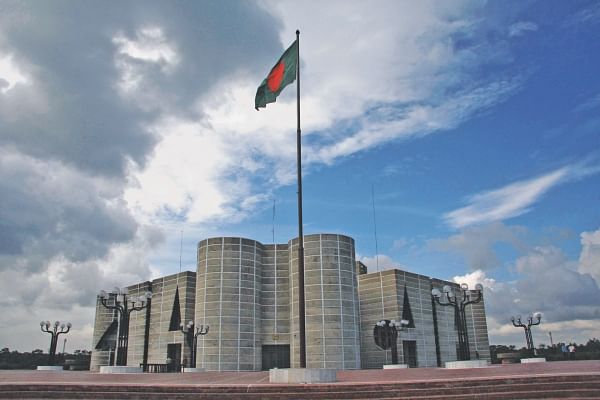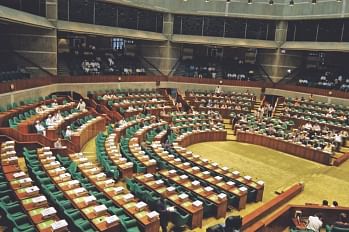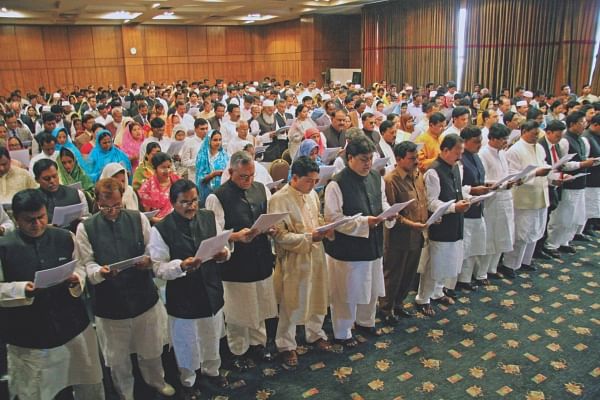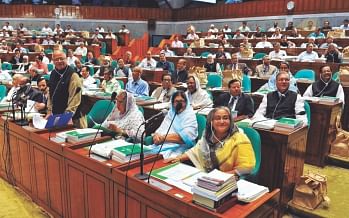| Home - Back Issues - The Team - Contact Us |
 |
| Volume 12 |Issue 02| January 11, 2013 | |
|
|
Current Affairs
BROKEN PROMISES With the first four years gone and only nine months in hand the Awami League has an array of electoral promises to fulfil Shakhawat Liton Read their Lips… The impact of the pledge was considerable in the battle of ballots. Many Bush faithfuls believed that it had helped Bush to win the presidential election. While in the White House, Bush found it quite challenging to keep the promise he had made in the run up to the election. During his term recession began and the fiscal deficit widened. So, he had to raise taxes, violating his own promises. He also broke some other promises, but 'Read my lips: no new taxes'- has become the most famous. Making big promises and the failure to meet them may result in disaster–it happened in the case of Bush. In the presidential election campaign in 1992, Pat Buchanan had made extensive use of the phrase in his strong challenge to Bush in the Republican primaries. And in the final battle of ballots, his opponent Democrat party nominee Bill Clinton also pointed to it as evidence of Bush's untrustworthiness, which contributed to Bush's losing his bid for re-election. In recent years, there are some glaring examples of prime ministers in UK, Italy, Australia and Ireland breaking electoral pledges, which in these countries triggers huge outcry– top politicians face criticism and pay heavily for it. Bangladesh is no exception. But it is different from other countries in the sense that wholesale violation of electoral promises is only possible in Bangladesh. Before the election, top leaders of the political parties, especially the Awami League and the BNP, appear before the nation with a mouthful of promises. People are tempted to believe them only to be disappointed when the latter assume office after wining the election. An Opportunity Lost The AL said the five-year-misrule of the BNP-Jamaat alliance government did away with all the good work of the Awami League government. The situation in Bangladesh became grim both politically and economically, said the AL in its charter for change.
It however acknowledged some success of the then army backed caretaker government. "The government has been ruling the country with various limitations, weaknesses, lapses as well as some successes.” In view of the AL, as cited in the charter for changes, the ninth parliamentary elections had created an opportunity for the re-establishment of democracy and inspired hopes for rapid socio-economic development mainly by providing good governance and people's participation. "In this context Bangladesh Awami League declares its election manifesto with the promise of change by making our dear motherland a country free from hunger and poverty, illiteracy, corruption and militancy. We believe that the right to vote and the right to food hold the key to the alleviation of poverty," said the charter for change unveiled by AL President Sheikh Hasina on December 12, 2008. It further stated: "We envision a democratic system where people choose their government freely and get services from it without hassle, enjoy freedom from fear and intolerance, live with dignity; where every citizen is assured of social justice, environmental protection, human rights and equal opportunities; and where the rule of law and good governance flourish. We envision a liberal, progressive and democratic welfare state." In line with the dream the party had envisioned, the AL placed before the nation a set of election pledges highlighting five promises: lowering commodity prices and avoiding depression, curbing corruption, raising production of power and energy, eradication of poverty and inequity, and establishment of good governance. People extended their wholehearted support to the AL, giving it an overwhelming parliamentary majority. As the AL cited in its manifesto, people provided the party with an opportunity to the "re-establishment of democracy" and inspired hopes for rapid socio-economic development mainly by providing good governance and people's participation. In addition to the overwhelming majority, the AL got another landslide victory in the January 22, 2009 upazila parishad elections. Almost all of the 482 upazila chairmen and around 1,000 vice-chairmen elected in the crucial local government bodies belong to ruling AL leaders. So, at the beginning of the journey, the AL-led government also got a strong army of workers at grassroots level to go ahead with its agenda. What was required was some visionary leadership from the top. How did the AL use such a huge political mandate? Or have it been able to deliver its electoral pledges? Or did the party lose the huge opportunity to do something extraordinary to write a new political history? Four years have gone. On January 6, Sheikh Hasina-led government stepped into its fifth and final year. Opinion polls conducted by leading newspapers show how miserably the AL-led government lost its popularity which skyrocketed when it assumed office in January 2009. A Saga of Broken Promises What has the government done in the last four years? It hasn't constituted the zila parishads by holding their elections, let alone make them strengthened. It however appointed 61 ruling party men as administrators in the zila parishads in December 2011, ignoring the constitutional spirit of the local government. The constitution in no way allows unelected persons to run the local government bodies.
Thanks to the tireless efforts made by the past caretaker government and the erstwhile Election Commission, the polls to upazila parishads were held on January 22, 2009, two weeks after the AL assumed office. In fact, the election schedule was announced by the EC during the caretaker government's term in office, and the AL-led government did not dare to postpone the upazila election. But from the very beginning, the upazila parishads had to bear the brunt of the government's brutal negligence. The upazila parishads could not be made functional. The current state of upazila parishads demonstrates the government's indifference to decentralisation of power. As per its electoral pledges, the AL did not free the civil administration and police and other law and order enforcing agencies of politicisation. Rather the situation in the last four years worsened in many cases. Although the AL pledged to do so, extra-judicial killing has not stopped; rather forced disappearance has appeared as a new menace in recent years, a clear deterioration of human rights. The AL-led government could not take tough actions to enforce rule of law, which encouraged the ruling party men, especially the pro-AL student organisation Bangladesh Chhatra League, to continue with violent activities, extortion and tender manipulation. Controversial activities of many AL lawmakers and ministers went unpunished. Wholesale withdrawal of 'politically motivated' cases and granting record number of presidential clemency to ruling party men appeared as a direct assault on the principle of rule of law. The government also could not go tough on corruption. The arrest of former railway minister's assistant personal secretary in middle of the night with a sack-full of money appeared as another example of corruption. The public perception is that former railway minister was involved in the scandal.
But the prime minister has kept the former railway minister in her cabinet as "a minister without portfolio" although he had resigned from her cabinet after the scandal. The Anti-Corruption Commission has also proved that it is unable to function independently as it is shown in its failure to sue former communications Minister Syed Abul Hossain and former state minister Abul Hasan Chowdhury for their involvement in 'conspiracy of corruption' in the Padma bridge project. The AL-led government has yet to move to appoint an Ombudsman to promote good governance, and disclosure of wealth statements and sources of income of the prime minister, ministers, lawmakers and their family members every year remain a distant dream. Politics has become even more confrontational, making a mockery of the AL's electoral pledges. The ruling AL is yet to take the initiative to formulate a consensual and unanimous charter on political behaviour. Moreover, unilateral cancellation of the caretaker government system in June 2011 has triggered fears of a political crisis ahead of the next parliamentary polls. And thanks to the worsening political situation, the parliament cannot function properly, although the ruling AL pledged to take all measures to make the House effective. The judiciary could not contribute to the expected extent to improve governance as controversial appointments made by the ruling alliance has undermined its independence. Bad Dwarfs the Good Another major achievement of the government is the beginning of the trial of war criminals. People lauded the efforts. But the trial has seen a tempestuous ride. Bumper production of rice is also a glittering achievement of the current regime, but the success lost the shine as the farmers are not getting the fair price of their production due to poor governance. The government, it seems, is unable to take stern actions against plunderers who embezzled billions of taka from the stock market and the Sonali Bank-Hall-Mark loan scam has also reduced public confidence in the government. Similarly, the government's inaction against wrongdoings and misdeeds by ruling party men has blemished many of its successes. No achievement can give people sustainable benefit unless or until governance system is improved, good governance starts to take roots and rule of law is upheld. Unfortunately, the current government has miserably failed to improve good governance and rule of law. One thing is now clear–many of the big pledges have turned into a burden for the AL. In the next polls its opponent will be ruthless in portraying the AL's failure. People and the media will also make a post-mortem of the new pledges in light of the promises made in the 2008 polls. This time things will not be easy for the AL. The writer is Senior Reporter, The Daily Star.
|
||||||||
Copyright
(R) thedailystar.net 2013 |



